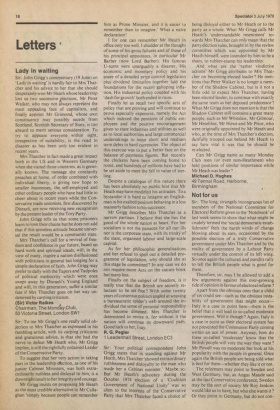Sir: To me Mr Grigg's one really solid objection to
Mrs Thatcher as expressed in his rambling article, with its carping criticisms and gratuitous advice, is that she had the nerve to defeat Mt Heath who, Mr Grigg implies, is still the rightfully ordained Leader of the Conservative Party.
To suggest that her very action in taking part in the leadership election, as one of his junior Cabinet Ministers, was both extraordinarily ruthless and disloyal to him, is a downright insult to her integrity and courage.
Mr Grigg insists on proposing Mr Heath as the most credible alternative to Mr Callaghan 'simply because people can remember him as Prime Minister, and it is easier to remember than to imagine.' What a naïve declaration!
1 for one can remember Mr Heath in office only too well. I shudder at the thought of some of his gross failures and of those of his principal appointees, in particular Mr Barber (now Lord Barber). His famous U-turns were unarguably a disaster. His economic and monetary policy and his snare of a detailed price control legislation plus dividend limitation together laid the foundations for the recent galloping inflation. His industrial policy coupled with his 'dash for growth' both ended in ruins.
Finally let us recall two specific acts of policy that are proving and will continue to prove especially expensive, namely the Act which indexed the pensions of public employees and the positive encouragement given to state industries and utilities as well as to local authorities and large commercial undertakings to incur short and medium term debts in hard currencies. The object of this exercise was to put a better face on the balance of payments figures. But recently the chickens have been coming home to roost, and hundreds of millions have had to be set aside to meet the fall in value of sterling.
Despite a catalogue of this nature there has been absolutely no public hint that Mr Heath may have modified his attitudes. To a bystander it is hard to imagine an Englishman in his exalted position behaving in a less mannerly fashion to his successor.
Mr Grigg describes Mrs Thatcher as a narrow partisan. I believe that she has the good of the whole nation at heart. For her socialism is not the panacea for all our ills nor is the corporate state, with its trinity of the state, organised labour and large-scale capital.
As for her philosophic generalisations and her refusal to spell out a detailed programme of legislation, why should she at this stage be committed ? In any case we do not require more Acts on the statute book but many less.
Finally on the subject of freedom, is it really true that the British are secretly reluctant to be set free? With some twenty years of consensus politics angled at weaving a bureaucratic spider's web around the individual the sense of personal responsibility has become dimmed. Mrs Thatcher is determined to revive it, for without it the nation will continue its downward path. Good luck to her, I say.
R. G. Pegler 1 Leadenhall Street, London EC3


































 Previous page
Previous page